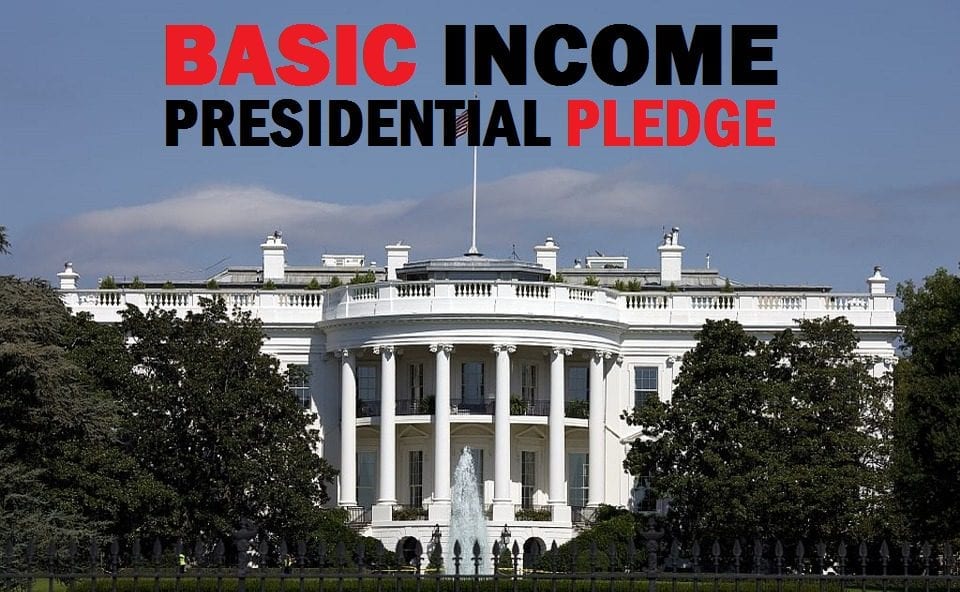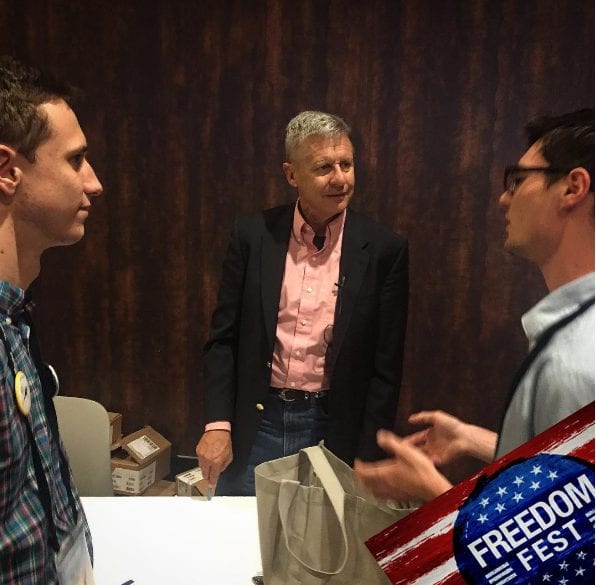
by Tyler Prochazka | Aug 3, 2016 | Opinion
As the US Presidential race heats up, most of the candidates have already made their opinions known regarding Universal Basic Income. Regardless, it is imperative that the United States fund new basic income pilot programs to test how a basic income would affect the current economy.
The United States experimented with a type of basic income in the 1960s and 70s, but it is time to collect new data. This is the first step toward implementing a full UBI in the United States.
Recent pilot programs throughout the world, such as in India, have given the basic income movement ammunition to push its message, showing improved educational, health and entrepreneurial outcomes. A pilot program in the United States would show policymakers that a basic income is far superior to our outdated bureaucratic safety net.
Sign this petition to ask all of the US presidential candidates to take a pledge to fund basic income pilot programs throughout the country.

by Tyler Prochazka | Jul 23, 2016 | News
Probably for the first time in US history, the basic income is becoming an issue in the presidential election. Most of the candidates have already made their positions known. Two candidates, Jill Stein and Gary Johnson, appear to be the most supportive of the basic income. Although, Stein recently said basic income is a “visionary goal” and not something she is going to push as part of her agenda.
Hillary Clinton
The candidate said she is “not ready to go there,” but she would expand the earned income tax credit. She said distributing money without producing income is not something that “works for democracy and I don’t think it works for most people.”
Gary Johnson
Johnson said he was “open” to the idea of a Universal Basic Income based on its ability to save bureaucratic costs. Johnson directly supports the FairTax, which has a basic income component in the form of a prebate.
Jill Stein
UPDATE: On a recent CNN interview, Stein said guaranteed minimum income is a “visionary goal and not one of the practical goal posts of our agenda.”
“(Guaranteed basic income is) not something I’m willing to move forward at this point,” she said.
Donald Trump
Trump has not commented on the basic income. Requests for comment from the campaign were not returned.

by Tyler Prochazka | Jul 18, 2016 | News
With the US libertarian presidential candidate pushing double-digits in the polls for the first time in history, many are starting to take former New Mexico governor Gary Johnson’s policy ideas seriously. While signing books at the libertarian Freedom Fest conference, Johnson said he was “open” to the idea of a Universal Basic Income (UBI).
Like many libertarians, Johnson said he liked the idea of the UBI because of its potential to save money in bureaucratic costs, freeing up more money to give people directly. During the exchange, we discussed how directly giving a basic income would increase the value of each dollar spent for the recipient, as opposed to in-kind services, such as food stamps, which restrict purchases.
At the same time, I asked Johnson about his position on the carbon tax and using these funds to fund the basic income. He once again said he was “open” to the idea.
“There are a lot of smart libertarians that support the carbon tax, so I don’t discount the idea,” Johnson said.
Johnson was attending Freedom Fest in Las Vegas to discuss term limits and answer questions about his candidacy with his running mate, former Massachusetts governor William Weld. He is currently polling around 13 percent against Donald Trump, Jill Stein, and Hillary Clinton.
Photo source: Instagram

by Tyler Prochazka | Jul 8, 2016 | News
This past month, United Kingdom’s Compass advocacy and publication website published an analysis of the basic income. The report discussed how the basic income could be introduced in the UK, and how it would interact with other social service programs.
One of the authors, Stewart Lansley, a Compass associate and visiting fellow in the School of Policy Studies at the University of Bristol, discussed how “income support is being weakened while secure work is becoming less available,” and how the basic income would address the impending “robotic revolution.”
The Compass report mentions the sanctions that have been introduced in UK’s entitlement system and how that was leading some to fall through the cracks. What do you think the biggest challenge of the UK’s current entitlement system is and how does the UBI address it?
Britain’s system of social security – complex and unpopular – needs a fundamental rethink. With much greater reliance on means-testing, and the erosion of the role of universal benefits, it has moved sharply away from the original Beveridge blueprint. Further, the level of conditionality has been raised, with governments exercising greater and greater control over the lives of claimants, making the system much more punitive and intrusive. Since 2013, more than one million claimants have been sanctioned, leading to a loss of benefits for between one month and three years for some of the most vulnerable of claimants.
Mass sanctioning has led to an increase in destitution and has been one of the principal drivers of the great surge in dependency on food banks. By guaranteeing a weekly income, even at a modest rate, a universal basic income (UBI) would boost the universal element of income support, reduce dependency on means-testing and bring an end to sanctioning.
What are the economic and societal risks that the UBI schemes outlined in the Compass report address?
A UBI would help tackle two key economic and social risks. First, the widespread insecurity and growing risk of poverty associated with work. Today, more than 60 percent of those in relative poverty in the UK are in work, a significant rise compared with the immediate post-war decades. By providing a guaranteed, if modest income, a UBI offers a more robust safety net in a much more insecure, low paid and fragile working environment and will help reduce the risk of poverty amongst those in work.
Secondly, whatever its ultimate impact, the impending technological and robotic revolution is set to bring further disruption and upheaval to jobs and pay. Crucially, a UBI offers an effective way of providing income protection from the wider repercussions of accelerated automation. Further, the robotic revolution may eventually bring significant productivity gains, though to what extent and when remains uncertain. Although these are yet to be realized, these could offer potentially new and significant social and economic opportunities. There is a very real risk, however, that the gains – if they are realized – will be colonized by a small powerful elite, leading to a further jump in inequality and a surge in joblessness. A UBI would play a key role in ensuring that such gains are more evenly shared.
Do you think the alignment between the left and the right over the UBI is sustainable once the specific policy details for implementation are worked out? For example, the report makes clear the UBI would not be revenue neutral nor would it eliminate all means-tested benefits, which might alienate some supporters on the right.
The right and left see a UBI from very different standpoints. The right favours a basic income as a way of achieving a smaller state, and would see its introduction as an opportunity to sweep away a range of other forms of social protection. This is undoubtedly the motive behind the support coming from some Silicon Valley enthusiasts.
The left, on the other hand, views such a scheme as part of a strong state, as a way of securing a robust income floor, of tackling poverty and as a means of promoting equal citizenship. For the left, it is a profoundly democratic and egalitarian concept that promotes both security and greater personal freedom, and a recognition that all citizens have the right to some minimal claim on national income.
These views are clearly incompatible and it is inconceivable that a scheme could be devised that satisfied both sides. Left supporters are clear that a UBI scheme must be seen as a supplement to the wider public provision of services and not as a substitute. A continuing and strengthened role for the public provision of key public services and other forms of state intervention including a generous living wage remain essential as a way of creating further platforms for a more equal and just society.
What other benefits might a UBI offer?
Integral to the concept of a UBI is the promotion of greater freedom and choice, progressive changes with transformative potential. By providing basic security, it would give people more time and more bargaining power in the labour market. With a growing debate about how to balance work-life commitments in an era of much more insecure work, a UBI would offer people greater flexibility between work, leisure and education, and over the type and length of employment while providing greater opportunity for caring and wider community responsibilities. Some might choose to work less or take longer breaks between jobs. Others would be incentivized to start businesses. Some might drop out of work entirely to care or retrain while others might devote more time to leisure, personal care or community support and less to paid work. But implicit to a UBI is that all lifestyle choices would be equally valued.
Importantly, a UBI would both acknowledge and provide financial support for the mass of unpaid work, disproportionately undertaken by women, in childcare, care for the elderly and voluntary help in the wider community.
It would value but not over-value work. The solution to working age poverty has traditionally been through a mix of decently paid employment and state income support. But income support is being weakened while secure work is becoming less available. One of the great strengths of a basic income is that it separates survival from employment and production. Tackling poverty would become less dependent on the ‘work guarantee`.
In the various schemes outlined in the report, it is noted that some form of disability benefits and others would be preserved with the UBI. How would these benefits likely operate with a UBI and how would they change?
Because a flat rate payment makes no allowance for those with additional needs, some types of means-testing would need to stay, even as we moved over time to a fuller and more generous scheme. A feasible UBI system would, for example, need to be supplemented with, at least, the continuation of disability benefits and additional help to cope with high and variable essential living costs, especially housing and childcare.
To deal with the additional costs of disability, existing benefits for disabled people would remain and run alongside the UBI. In the simulations of different UBI schemes in the report, we have retained the Personal Independence Payment and Employment and Support Allowance.
What would be the benefits of creating a Social Wealth Fund to finance the UBI?
Creating a UBI-linked social wealth fund would be one way of securing an independent source of funding outside of the general tax pool. Social wealth funds are a potentially powerful tool in the progressive policy armoury. They are collectively held financial funds, publicly owned, and used for the wider social benefit of society. Such funds have been widely used across a range of countries and would ensure that a higher proportion of the national wealth is held in common and used for public benefit and not for the interests of the few. They are a way of ensuring that at least part of the benefits of some economic activity are pooled and shared amongst all citizens and across generations.
There is already one example of a fund dedicated to a citizen’s payment, one operating in Alaska since 1982. Here, the returns from a sovereign wealth fund, funded by oil revenue, are used to pay an annual citizen’s dividend. There is an important principle involved in such an arrangement: that citizens are the proper owners of the environment and have the right to share equally in its benefits. The benefits from a common asset should not be hived off to a small number of private owners.
Although the UK has already spent most of its oil revenue, there is no reason why such a social wealth fund could not be established using other sources of income. These could include the dividends from a range of other assets – including other natural resources – and the occasional one-off taxes on windfall profits. As in Alaska, such a fund could be allowed to grow over time, with part of the proceeds from its management paid back into the fund, and part used each year to partially fund a UBI scheme. Over time, such a fund could grow significantly, sufficient to help top up any shortfall necessary to pay for a workable UBI scheme.
An alternative, and more radical way of paying for a dedicated UBI fund would be by the dilution of the heavy concentration of capital ownership, achieved through a small annual charge on the owners of shares. Such a proposal was originally made by the distinguished economist and Nobel Laureate James Meade in the 1960s, as a direct way of tackling the risk of ever-growing inequality. Such an idea was widely debated and discussed in the UK, and in some European nations, in the 1970s and 1980s, while one version of such a scheme – the wage-earner fund – was introduced in Sweden in 1981 and lasted for 10 years, though it was not used to fund a UBI or citizen’s payment.
The report notes the growing support across Europe and the UK for the UBI. What are some steps UBI advocates can take to make it a reality?
The pilot schemes being planned for Canada, Finland, the Netherlands and France are having a profound effect on the wider debate about UBI. These forthcoming experiments are helping to build momentum in support of an idea that, until recently was confined mostly to a few think tanks, commentators and academics. Crucially, they will help provide some evidence of the dynamic effects – including on the incentive to work, employment patterns, changes in participants’ well-being and the reaction of employers.
The pilots have helped build interest in the UK, and it is now time to start building on that to promote a much wider national debate on the issue.
Ultimately, a real test of how such a scheme would work depends on the application of a proper, lengthy and adequately sized pilot with a control group. To take advantage of these developments, the UK campaign should follow the lead taken by others and work to build to case for its own pilot scheme.

by Tyler Prochazka | Jul 7, 2016 | News
“Shouldn’t I have enough to eat? And don’t I deserve a safe place to sleep?”
These are the first lines from the song that shook up this year’s North American Basic Income Guarantee Congress. The song, “Just Because I’m Alive,” was performed live at the congress by musician Brandy Moore, an advocate for the basic income.
Moore is starting a GoFundMe campaign to help fund a studio version of the song that she hopes to release in August. Moore said she has already raised over 10 percent of the goal, and hopes “the momentum keeps going.”
One of the primary reasons that Moore supports the basic income is that it would let all of us be “free to do what we want with our lives.”
“I believe that art is a priceless contribution to society and that artists should be valued. I believe that all the unpaid work that people carry out in our society should be recognized as priceless as well. Anytime anyone is caring for another who cannot care for themselves in some way,” Moore said.
About two years ago, Moore came across the idea of basic income on Facebook and, as she puts it, became “intrigued.”
Her curiosity did not stop there . Moore was inspired to write a song about basic income and wrote it in “one sitting.” She said she started with the first two lines of the song “and everything else flowed out of that.”
Moore said that it is important to create art related to the basic income, because art “has the ability to touch hearts and inspire minds in a very immediate way.”
“It gives a voice to feelings and subjects that people often find hard to talk about in words to each other about, but still need to be expressed. It helps people feel less alone and more connected with the rest of humanity,” Moore said.
“It beautifies our lives. It captures people’s attentions and gets conversations going. It can make an unfamiliar idea feel more acceptable because it has touched people in a deeper way than it would have by just talking about it.”
Ursule Critoph, an attendee at NABIG, said Moore’s performance “struck a chord” with the audience. Critoph said using art to promote the basic income will help “appeal to the human heart and spirit.”
“While Brandy never mentioned the words basic income, her lyrics express the essential foundations that underlie the importance of a guaranteed basic income. Appealing to the universal human need for affirmation, food, shelter and other aspects of a full life is critical to convincing persons that access to a basic income must be a universal right,” Critoph said.
Maria Wong, a worker at the Vancouver Rape Relief and Women’s Shelter, also listened to Moore’s live performance. She said loved the lyrics because it illustrated the reason she is “fighting” for the basic income: “it’s a human right.”
Wong said the basic income would help women, such as those at the shelter.
“Women experience poverty at higher levels because of their responsibilities to care for family and lack of options or value in the workforce. We think a Guaranteed Livable Income will give women more autonomy and be less invisible in society,” Wong said.
Prior to becoming a full-time artist, Moore worked as an office temp, but she said she “hated the way it would suck all my energy away,” so she started focusing wholly on her music.
She said she thinks that others should also have the choice to do what they love.
“We were meant to be free,” Moore said. “And when enough of us believe that we deserve to be free, we will be.”
Click here to see the live performance.
Lyrics:
Shouldn’t I have enough to eat?
And don’t I deserve a safe place to sleep?
Where no one can take what doesn’t belong to them,
And I don’t have to look over my shoulder
Why must I pay for my existence
And why must I prove my worthiness
I have a right to basic needs
Why? Why? Why? Why? Why? Just because I’m alive
I don’t look like you
And I don’t act like you
And I could never make it in your world
But I still deserve a decent life
Why? Why? Why? Why? Why? Just because I’m alive
I’m alive. Just because I’m alive
I’m hungry
I’m cold
I’m lonely
I feel
Just like you do
Why? Why? Why? Why? Why? Just because I’m alive
I’m alive. Just because I’m alive
Alive Alive Alive
Just because I’m alive
Shouldn’t I have enough to eat?
And don’t I deserve a safe place to sleep?






